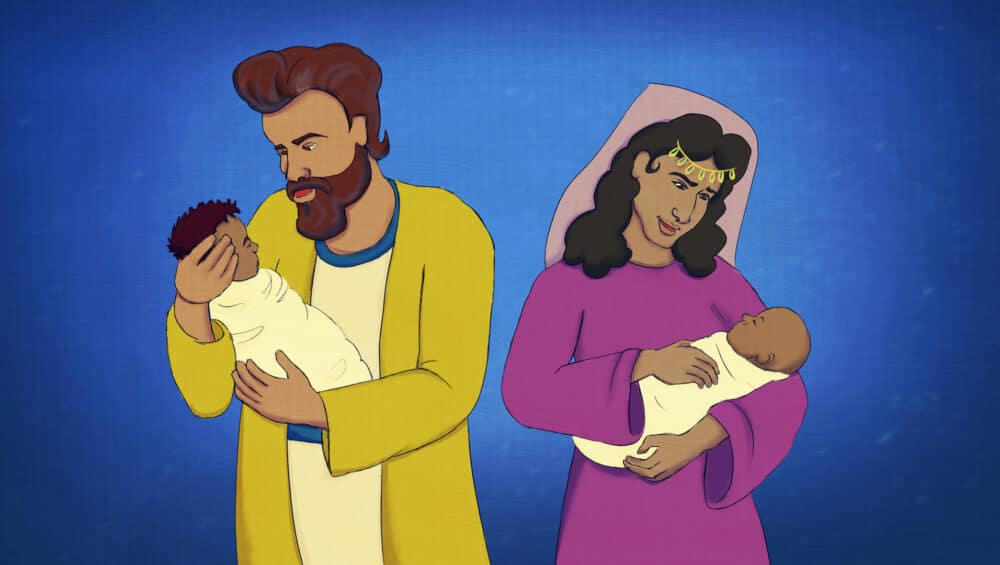Welcome to Livin’ Light’s Bible-In-A-Year challenge of discovering God’s love for us and His purpose for our lives. Here is the format for this great adventure: The daily reading assignment is posted at 5 a.m. After each day’s reading, Leigh An Coplin, the blog host, shares observations and poses questions about difficult passages to Rob Fields, who studied Christian Education at Asbury Seminary and currently teaches Biology in the Orlando area. To start from the beginning, click on 365 Bible Readings and scroll down to Day 1. The reading schedule is taken from The One Year Chronological Bible NLT.
Today’s Reading
— Genesis 21:8-23:20
— Genesis 11:32
— Genesis 24
(2064-2026 BC) Click here for a timeline of the whole Bible.
Questions & Observations
O. (21:12): God seems to be saying that both women are important, but Sarah is Abraham’s wife and he should please her.
O. (21:28): Abraham added 7 ewes to the covenant he made with Abimelech. If you recall in Day 3’s answers, the number “7” signifies completeness.
Q. (22:9-11): It’s hard to imagine Abraham willingly ready to sacrifice his son and Isaac willingly lying on the altar ready to be killed. Abraham’s trust in God has grown since he was afraid of the rulers killing him, a foreigner, and taking his beautiful wife. Abraham willingly sacrificing Isaac foretells God sacrificing his own son?
A. This passage, above all else, demonstrates Abraham’s absolute trust in God’s goodness and direction, even when the direction itself did not make sense to him. Since Abraham had such great trust in God, however, we should understand a few things. Abraham understood that this was the child that God had promised him; all of Abraham’s descendants were going to come from Isaac. So there had to be some way that this was going to be true — God had proven Himself faithful to Abraham, and Abraham’s obedience I think reflects this in his decision making. Abraham understood that God was going to provide for him in some way (see 22:8 and 13). Note that when Abraham leaves his servant and he and Isaac continue on together, he uses the word “we” when talking about his return (22:5). He fully expects to return with his son. The writer of Hebrews also points to Abraham’s thinking: that even if he killed Isaac, God was capable of bringing him back from the dead (Hebrews 11:17-19) and restoring him to Abraham. So there certainly was a great deal of trust in Abraham following God’s commands, but the text implies Abraham believed that the loss of his son would not be permanent.
Q. (22:11) The text says that an Angel of the Lord spoke to Isaac. I always thought it was the Lord himself. Angels seem to have a lot of authority with God. Will we learn more about angels later?
A. The word “angel” means messenger, and it is tough for us to understand that cultural understanding of the ancient messenger. Basically, an official messenger (sometimes called a herald) was seen and treated as though they were actually the king or ruler who sent them; the mindset was that they did not merely speak on behalf of the king, but AS the king (hopefully you can see the difference). In this light, it is more clear what the OT writers want us to understand: a messenger or angel of God should be read as the actual presence of God being there.
This helps explain why sometimes the language gets a bit murky when describing an angel appearing, but God doing the talking (we will see several more examples of this, notably in Exodus 3 in the call of Moses). This appears to be strictly an OT distinction: angels in the New Testament (such as Gabriel in Luke 1) speak on BEHALF of God, rather than as God. Honestly, I am not sure the reasons for this, but it might have to do with a cultural shift in the understanding of the role of angels.
One other note: the concept of angels is not one scripture appears very interested in fleshing out (no pun intended) for us. While scripture makes it clear that angels (and demons frankly) are real, it almost never provides detailed accounts of them. This ultimately is because the focus of the reader should be on God, not on God’s messenger.
Q. (22:18): This is telling of Israel. What is the significance of Israel? Or, do we get into this later? This verse says “all the nations of the earth will be blessed.” What does this say about predestination and the chosen?
A. I think that this question has multiple answers that will unfold over the remaining course of the Biblical story. On one level, we see in Exodus that God describes the Israelites (you’ll see where the name comes from shortly) as a chosen people to show what right relationship with God should look like- this is part of how the Ten Commandments will come into play (more on that later). The problem is that (he he, spoiler alert) the Israelites fail to live up to the promises that they make to God, despite Him remaining faithful. But where Israel fails, God sends the Messiah into the world to succeed where ordinary human fell short. A central theme of Jesus’ ministry is continuing this quest to reunite God and man: Jesus speaks of the ways that people can walk in right relationship with God, and that He himself is at the heart of this message. And since Jesus (the Messiah or Christ) is Jewish or an Israelite, Christians often assume that the promise to Abraham that the entire world would be blessed by his offspring refer to Jesus himself.
Q. (23:5): The Hittites respect Abraham calling him “my lord” and an “honored prince.” Is this because he had favor with God?
A. I think so. Abraham had clearly proven himself a force to be reckoned with (because of God, not because of anything Abraham had done), so that even the elders of other clans and tribes show their reverence for him.
O. (24:26-27): There is a strong respect between the Lord and Abraham. They both serve one another. Abraham’s servants carry the same trust in God as Abraham. Abraham must have been a successful champion for the Lord to his people. I like to see the strong relationship that God makes with his followers and how much He will work for them.
Q. (24:40): Abraham must be in God’s presence a lot if he can say that an angel will be with his servant on his trip to find Isaac a wife? How can Abraham order God’s angels?
A. Perhaps God informed Abraham of the way He would help Abraham’s servant. I don’t think Abraham is bossing any angels around.
Q. (24:48): Why was marrying relatives OK in Bible times?
A. Family relationships (which frankly border on what we would understand to be incest — the married relationship between close relatives) were more common in the ancient world than today. Though I would point out that even in the fairly recent modern world, we see things like closely interrelated monarchies of various countries who intermarry, so perhaps we are not as distant from this situation as we would like.
OK, here’s the bigger picture response: the big problem was not Abraham seeking a close relative for his son to marry; the big problem was intermarrying with the local tribes, which is clear Abraham does NOT want to do. Thus, when presented with the choices of either marrying close kin or intermarrying with other tribes, the choice is clear: Abraham and the generations of Israelites that follow him will choose to “preserve” their ethnic heritage. This will actually become part of the Law: there will be particular commands against intermarrying, again for the purpose of being a nation set apart for God’s purposes.
O. (24:54): Serving meals and washing feet have been shown to be proper ways to serve guests. I like to see the love for the Lord and love of one another displayed throughout Abraham’s extended family.
For further study
— Abraham’s story of trusting God is one to bookmark and reference over and over again to help us see that trusting God is vital and He really cares for us. https://livinlight.org/blog/give-yourself-a-solid-foundation/
— Why in the world would God ask anyone to sacrifice their one and only son? https://bibleproject.com/articles/why-did-god-ask-abraham-to-sacrifice-isaac/
Tomorrow’s reading: Genesis 25:1-4; 1 Chronicles 1:32:33; Genesis 25:5-6, 12-18; 1 Chronicles 1:28-31, 34; Genesis 25:19-26, 7-11







